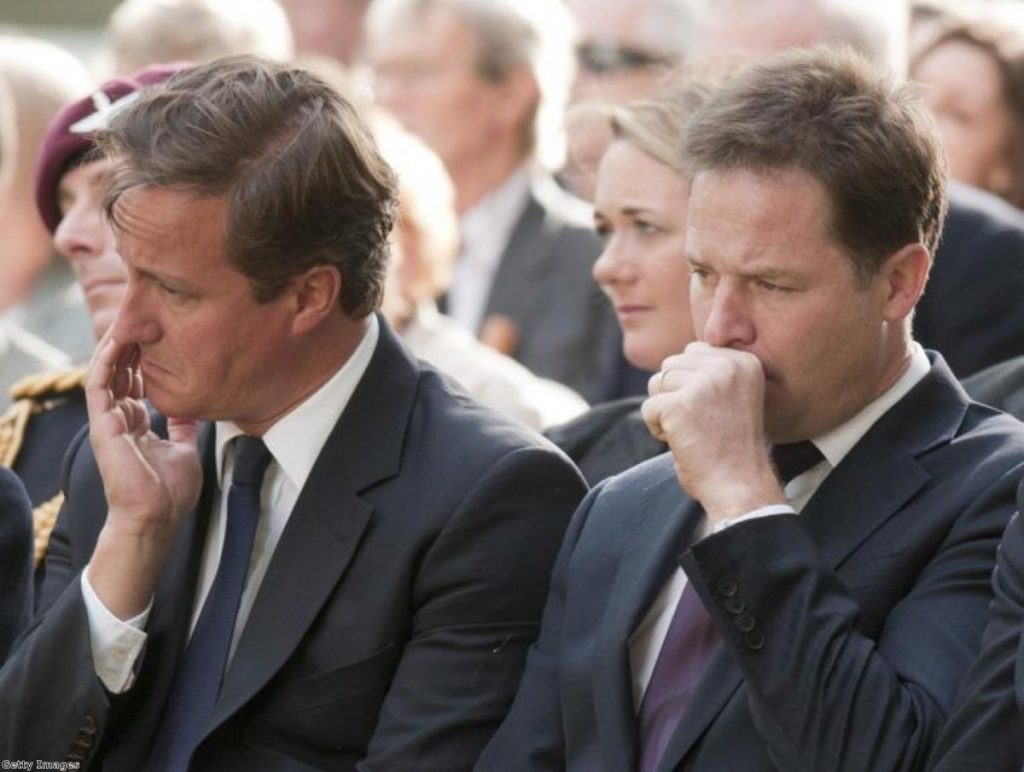The Week in Politics: Cameron loses his cool, Clegg just loses
Until now David Cameron has had a reputation for smoothness. He is a cool customer, dealing with triumph and disaster alike with rolled-up shortsleeves and a can-do demeanour.
When 91 of your MPs rebel it's enough to test any prime minister's patience, however. Even for this government, which is accustomed to flaky loyalty for the coalition's more divisive policies, the Tory rebellion over Lords reform was monstrous. Thatcher, Major, Blair and Brown would have howled with horror at this kind of uprising.
In the days building up to Tuesday evening's key vote ministers did their best to talk Tory MPs round to the idea of an elected second chamber. Cameron was among them, lambasting and finger-jabbing his way through a fraught interview with rebel ringleader Jesse Norman. But by the time of his remonstrating tantrum it was too late: Tories' scornful treatment of Nick Clegg when he presented the bill on Monday revealed most rebellion-minded backbenchers had long since made up their minds.
It all had an air of inevitability about it. Labour, doing everything they could to increase the coalition's discomfort. The Liberal Democrats, putting maximum pressure on the Tories and ultimately making very little difference. The Conservatives, digging in their heels so effectively the Lords reform bill moved barely an inch towards becoming law.


Technically that's not quite right, as in the end the Commons voted with a majority of 338 in favour of the reforms. Politically, though, it's a different story. The government didn't even try to pass the programme motion, setting up an immovable timetable for the legislation's progress, because it knew without Labour's support it would have lost.
Avoiding the humiliation doesn't change the result: the extent of the opposition on Cameron's backbenches is effectively a dealbreaker. Right now the future of the bill is the subject of deep uncertainty. Cameron, who has done his finger-jabbing best, is now shrugging his shoulders. The talk is of the Conservatives watering down the changes so drastically that they become close to meaningless.
Clegg called this a "triumph". What on earth does disaster look like?
Bob Diamond will have a clearer assessment of his own fortunes. The Barclays ex-boss gave in to pressure from Westminster, including from business secretary Vince Cable, over his enormous £20 million pension. While the Libor inquiry has been stripped of the most critical MPs, the political fallout from the scandal continued this week. George Osborne refused to apologise for pointing the finger at Ed Balls, despite the evidence of the Bank of England's deputy governor Paul Tucker. Miliband, seeking to harness public anger, gave an important but largely overshadowed speech on Monday. It took a few jokes at a journalists' lunch in Westminster to get the hacks to pay attention.
This was also the week when Cameron rolled out the red carpet for Francois Hollande, France's new president, who used humour to disguise the bitter feud now well developed between the pair. Evidence of Britain's deep suspicion to the continent came later in the week, when William Hague launched a comprehensive audit of Everything Wrong With Brussels. Hollande, who a worrying chunk of pub quiz goers assume is from the Netherlands, won't be impressed.
Other serious political developments should not be glossed over. Former Tory MP Anne Widdecombe embarked on her crusade to save the hedgehogs, while a Conservative MEP proposed the creation of a Thunderbirds-style International Rescue. If I was Clegg, I'd be supporting this idea very firmly. But even the Tracy brothers will struggle to extricate him from trouble come May 2015.

